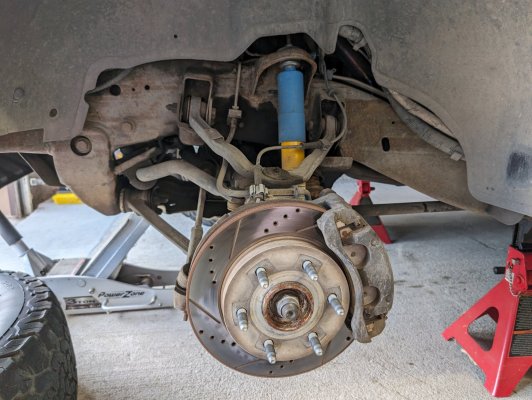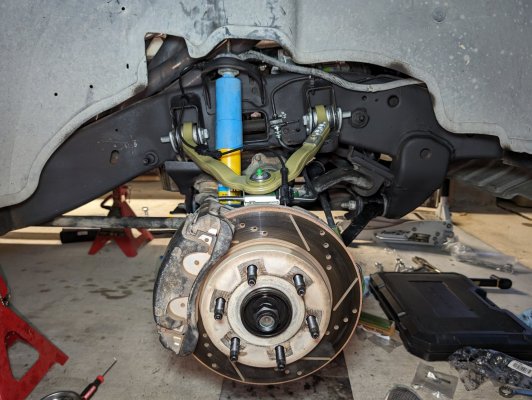squeeler642
TYF Newbie
- Joined
- Apr 3, 2014
- Posts
- 11
- Reaction score
- 13
Hi folks. Just did a whole front end job 3 months back on my 2003 Z71 Tahoe w/375k miles. Did all new upper/lower control arms, knuckles, sway bar links, inner/outer tie rods, pitman and idler arms, and brake lines. All ball joints and bushings came pre-installed in their respective places and I did either Moog or Mevotech performance on everything, whatever I felt was the best quality. Got it aligned at my local shop and the thing drives like a DREAM compared to my old worn out suspension... for the most part.
Ever since the overhaul, the thing just doesn't feel right over large bumps at speed. It kinda self-steers, where a large bump making the suspension travel significantly (transition to/from bridges, humps in the road, etc.) cause the wheel to pull left/right depending on the case. Most of the time when I go through those road features dead on (straight) with it feels like the left side of the truck is really smooth and the right side is just bouncing excessively, almost like it doesn't have shocks on it at all, or like there's 500 lbs of cargo loaded on the left side of the truck. None of this behavior was present before the overhaul...
I should say, I obviously had it aligned after that whole job, ended up being 2 sperate alignments by the same shop after the issue initially presented. At first I figured the alignment would straighten it out. They said it was good even though the caster spec was out by about half a degree (one side -1.6°, the other -2.1°) and they kept telling me you won't be able to feel that and that it's not a tire wearing adjustment. Toe and camber are dead on and I fine tuned the torsion keys to get matching L/R ride height, about 36.5" without my ass in the truck.
(Side note: how do you even measure caster on these trucks? Since there's no strut tower to adjust at the top, wouldn't you have to essentially take the wheel off and measure the angle of the knuckle relative to the upper/lower control arm mounting points? Caster adjustment is done by making opposite adjustments go the front/rear upper control arm camber bolts if I understand correctly.)
Open to any dialogue. Some pics of the new suspension attached.


Ever since the overhaul, the thing just doesn't feel right over large bumps at speed. It kinda self-steers, where a large bump making the suspension travel significantly (transition to/from bridges, humps in the road, etc.) cause the wheel to pull left/right depending on the case. Most of the time when I go through those road features dead on (straight) with it feels like the left side of the truck is really smooth and the right side is just bouncing excessively, almost like it doesn't have shocks on it at all, or like there's 500 lbs of cargo loaded on the left side of the truck. None of this behavior was present before the overhaul...
I should say, I obviously had it aligned after that whole job, ended up being 2 sperate alignments by the same shop after the issue initially presented. At first I figured the alignment would straighten it out. They said it was good even though the caster spec was out by about half a degree (one side -1.6°, the other -2.1°) and they kept telling me you won't be able to feel that and that it's not a tire wearing adjustment. Toe and camber are dead on and I fine tuned the torsion keys to get matching L/R ride height, about 36.5" without my ass in the truck.
(Side note: how do you even measure caster on these trucks? Since there's no strut tower to adjust at the top, wouldn't you have to essentially take the wheel off and measure the angle of the knuckle relative to the upper/lower control arm mounting points? Caster adjustment is done by making opposite adjustments go the front/rear upper control arm camber bolts if I understand correctly.)
Open to any dialogue. Some pics of the new suspension attached.


